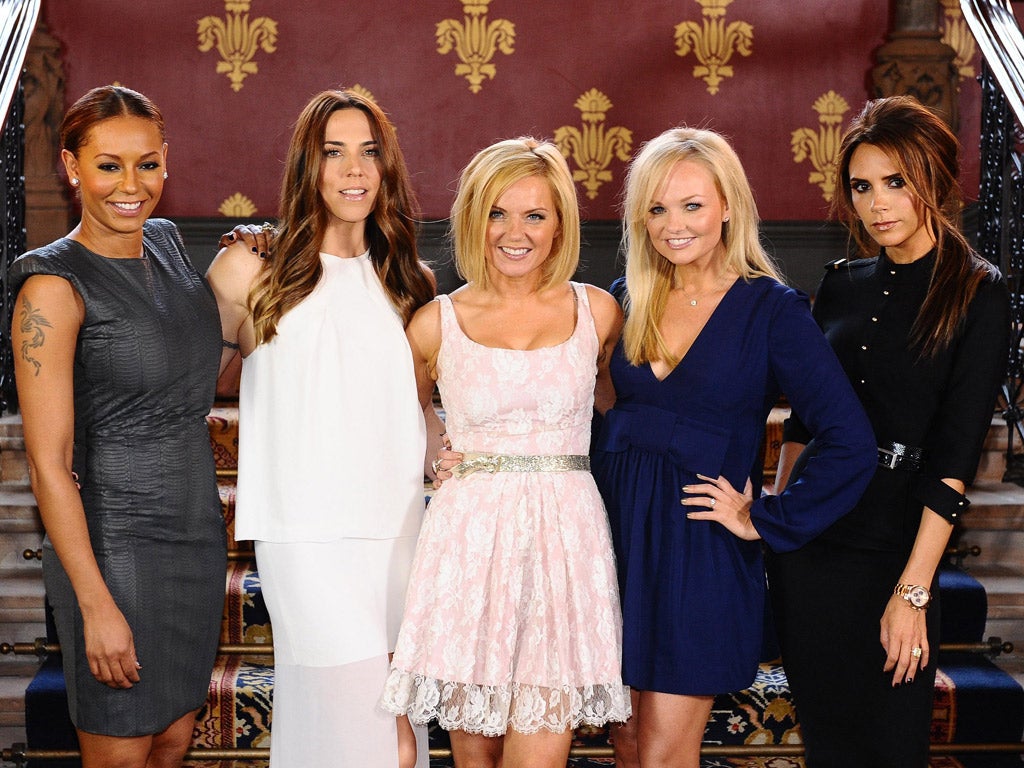David Lister: Tell you what I want, what I really, really want - genuine musicals
The week in arts

Even at its height I was never entirely sure what "Girl Power" was. And I understand from those who know them that the Spice Girls were never entirely sure either. But, in the world of musical theatre, launching a show with your hits as the score must come pretty close. It was a whole panoply of Girl Power, actually, the group themselves, the producer Judy Craymer and the writer Jennifer Saunders. If Craymer's global success with Mamma Mia is replicated, then all concerned are guaranteed to become extremely wealthy – make that wealthier.
My own little Trivial Pursuit question following the launch on Tuesday is to ask: "Who are the performers in the show?" Few will know or care. Like the director, they are not of major importance, at least at the launch stage. It's strange, as, with any other kind of theatre, actors and director are quite important. You'd be unlikely to buy tickets without knowing their identity.
But with jukebox musicals, it's the jukebox that takes pride of place. That's not to be snobbish. I've seen most of the ones on in London, Mamma Mia!, Jersey Boys, We Will Rock You, and they are all highly enjoyable, though I couldn't name a single actor or actress in any. It's what's on the jukebox that counts.
The Spice Girls' jukebox isn't at all bad. They certainly don't have the range of songs that Abba and Queen had, but they have enough to sustain a show, and the signs look good, particularly with a supremely witty writer like Jennifer Saunders on board. Personally, I'd have liked the show to tell the inside story of the tensions in the group, and the machinations of their Svengali, Simon Fuller, but then you can't have everything.
The problem is not whether they will do well with their show. It is where new British musicals will come from, as producers of musicals, with the occasional exception like Ghost and its new Dave Stewart score, play safe with the jukebox variety, or American imports.
Original musicals from fresh, young British writers are a rarity, in fact they're an endangered species; musicals from young, female writers are particularly rare. Now there's a thought. What could be a better illustration of true "Girl Power" than to empower female composers and lyricists for British musical theatre? It would just need someone to fund a scheme to find and encourage them, an Orange Prize for the musical-theatre world.
I can think of seven people immediately who could fund such bursaries: the Spice Girls, Miss Craymer and Miss Saunders. By diverting the tiniest fraction of the profits from the upcoming show to a scheme to find new female creators of musical theatre, they would be empowering women artists and, at the same time, greatly enhancing the future health of the stage. It would be wonderfully philanthropic. Now, that would be "Girl Power."
The scarcely believable ballad of John and Yoko
Yoko Ono is to be congratulated on one of the most striking reputation rehabilitations in recent history. Though her current exhibition at the Serpentine Gallery has received decidedly mixed reviews, she is accorded the respect she rarely was back in the mists of time. I remain, though, fascinated by some of the stories she brings. When she was interviewed on the Today programme, we were told that when she met John Lennon in 1966 she hadn't heard of The Beatles. What a dedicated artist she must have been during the previous three years – never opening a newspaper, never turning on the TV or radio, never conversing with a teenager.
Mixed messages from the playing fields of Lancing
I caught up this week with the absolutely excellent public-school double bill in the West End, David Hare's new play South Downs paired with Terence Rattigan's The Browning Version. Hare's play is informed by his own schooldays at Lancing College, but he does not name it, and like all good playwrights, his portrait of his subject is ambivalent and ambiguous, showing the loneliness and unhappiness at the school as well as its virtues.
Enjoy unlimited access to 70 million ad-free songs and podcasts with Amazon Music
Sign up now for a 30-day free trial
Enjoy unlimited access to 70 million ad-free songs and podcasts with Amazon Music
Sign up now for a 30-day free trial
But there is no such ambiguity on the back page of the programme, which displays a full page advertisement, declaring: "Lancing College – still a class act".
I felt rather odd having this assertion staring up at me throughout the play. It was a bit like watching Macbeth, and the programme having an ad from the tourist board, saying: "Scotland – still a country full of surprises."
Subscribe to Independent Premium to bookmark this article
Want to bookmark your favourite articles and stories to read or reference later? Start your Independent Premium subscription today.

Join our commenting forum
Join thought-provoking conversations, follow other Independent readers and see their replies